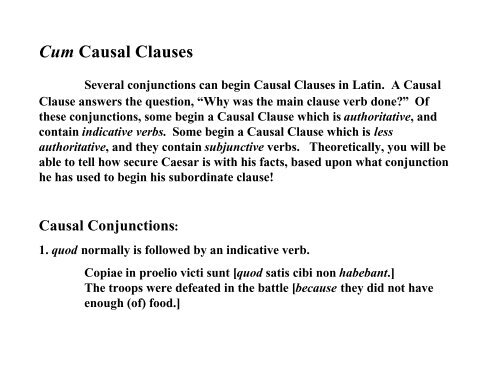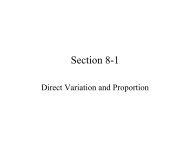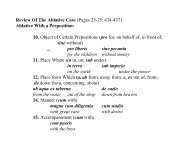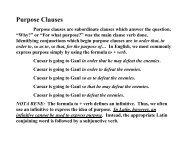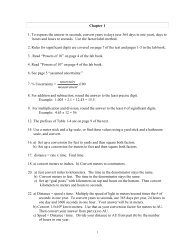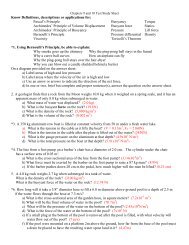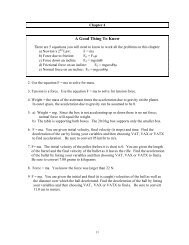Cum Causal Clauses
Cum Causal Clauses
Cum Causal Clauses
Create successful ePaper yourself
Turn your PDF publications into a flip-book with our unique Google optimized e-Paper software.
2. Quia normally takes the indicative.Dux urbem dedidit [quia hostes extra portas erant.]The general surrendered the city [because the enemy were outsidethe gates.]3. Quoniam normally takes the indicative.Dux urbem dedidit [quoniam hostes extra portas erant.]NOTA BENE: If quod or quia is followed by a subjunctive verb, it is to beassumed that the information within the <strong>Causal</strong> Clause is in doubt or turnedout to be in error.Dux urbem dedidit [quia hostes extra portas essent.]The general surrendered the city [because (he thought) the enemywere outside the gates (but he was mistaken).]
4. <strong>Cum</strong>, when it means “because” or “since,” always is followed by asubjunctive verb.Dux urbem dedidit [cum hostes extra portas essent.]The general surrendered the city [since the enemy were outsidethe gates.]Decima Legio victa est [cum dux captus esset.]The Tenth Legion was defeated [because its general had beencaptured.]
Special Notes about <strong>Causal</strong> <strong>Clauses</strong>1. Whether or not a Latin <strong>Causal</strong> Clause contains a subjunctive moodverb, always translate the verb as though it were indicative.2. Note that the word “since,” as used in English to denote a temporalclause, did not exist in Latin; “since” was always causal.3. <strong>Cum</strong> <strong>Causal</strong> <strong>Clauses</strong> are often difficult to identify in Latin, because theymay share the same formula with cum Circumstantial and cumConcessive <strong>Clauses</strong>. The best guide to determine whether a cum clauseis causal is context.Quiz #22: The vocabulary in the Words to Master list on Page 113.


